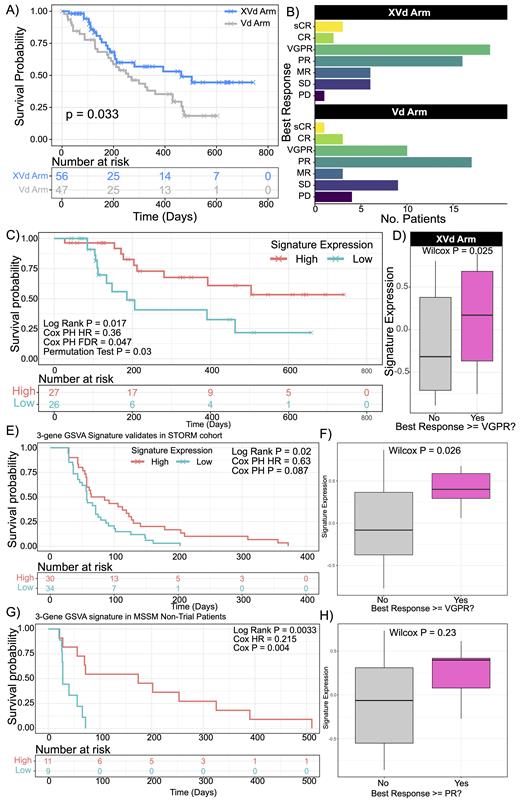Abstract
Selinexor acts by inhibiting the nuclear export protein XPO1; however, its mRNA expression does not correlate with response, and the biological mechanisms underlying treatment response for different patients remain unclear. There is a critically unmet need for validated genomic biomarkers to help guide treatment recommendations to selinexor based therapy. Here, we characterized the transcriptomic correlates of response to selinexor in data from 189 patients from multiple studies of selinexor-based therapy and identified and validated a 3-gene expression signature predictive of treatment response.
We performed RNA sequencing on CD138+ cells from 103 patients who participated in the BOSTON study, a phase III, open-label clinical trial of patients with multiple myeloma (MM) who were treated with selinexor, bortezomib and dexamethasone (XVd) after 1-3 lines of standard therapy versus a bortezomib and dexamethasone (Vd) regimen (Grosicki et al 2020 Lancet; Fig 1A-B). Then, we performed differential expression, followed by pathway analysis, to compare patients with long and short progression-free survival (PFS) in the XVd arm of the BOSTON dataset across various PFS and overall depth-of-response (OR) cutoffs. Here, we identified a total of 24 unique downregulated genes and 33 unique upregulated genes that were associated with longer PFS or better depth of response in the XVd arm (FDR < 0.05). Pathway analyses revealed downregulation of apoptosis and MYC targets in patients with selinexor-associated longer PFS or better depth of response (FDR < 0.05), consistent with the known relationship between depth and duration of response in MM.
Using the differentially expressed genes, we employed time-to-event univariate Cox proportional hazard models (CPH) with repeated 4-fold cross validation, log-rank testing, and spearman correlations to identify a novel signature that predicts PFS in the BOSTON dataset. This analysis revealed a GSVA score composed of three genes, WNT10A, DUSP1, and ETV7, that were upregulated in XVd patients with PFS > 120 days. Further, this signature accurately distinguished patients with long term PFS in the XVd arm of the BOSTON study (Fig 1C; log rank P = 0.017; spearman Rho = 0.46, P = 0.0007; CPH, FDR=0.047, HR=0.36 [95% CI = 0.14-0.84]). We also found that the signature significantly tracks with a depth of response of VGPR or better (Fig 1D, Wilcoxon P = 0.025).
Finally, we validated the accuracy of our signature using transcriptomic data from two external cohorts: the STORM trial of penta-refractory MM (N = 64; Chari et al., NEJM), and a cohort of patients treated with selinexor-based regimens at Mount Sinai who were not part of a clinical trial (N = 21). This signature validated successfully in the STORM study (Fig 1E, log-rank P = 0.02; spearman Rho = 0.18, P = 0.14; CPH P = 0.08, HR=0.63 [95% CI = 0.47-1.03 ]) and in the non-trial Mount Sinai cohort (Fig 1G, log-rank P = 0.0033; spearman Rho = 0.6, P = 0.0043; CPH P = 0.004, HR = 0.215 [95% = 0.15-0.72]). Additionally, the association of the signature expression with depth-of-response validated in the STORM cohort (Fig 1F; Wilcoxon P = 0.021), further supporting the robustness of our signature. We used the MMRF-COMMPASS dataset (N=700) as a negative control and found that the signature is not predictive of PFS in patients who were treated with non-selinexor based, standard of care therapies. Together, these results support the conclusion that our signature is specific to selinexor treatment response and is not reflective of overall prognosis.
We are currently performing experimental validation of the three genes in cell line experiments to better understand the mechanisms underlying their predictive power. We are also evaluating the utility of augmenting gene-expression based biomarkers with an ex-vivo mass-based biomarker assay to more accurately predict response to selinexor.
In summary, we report a novel gene expression signature for response to selinexor-based therapy in patients with MM. We have validated our findings in several external transcriptomic datasets of MM patients treated with selinexor-based regimens. This signature has important clinical significance as it could identify patients most likely to benefit from treatment with selinexor-based therapy, especially in earlier lines of therapy.
Stevens: Travera: Current Employment. Richter: Adaptive Biotechnologies: Speakers Bureau; Celgene: Consultancy; Janssen: Consultancy; BMS: Consultancy; Karyopharm: Consultancy; Antengene: Consultancy; Sanofi: Consultancy; X4 Pharmaceuticals: Consultancy; Oncopeptides: Consultancy; Adaptive Biotechnologies: Consultancy; Celgene: Speakers Bureau; Janssen: Speakers Bureau; Secura Bio: Consultancy; Astra Zeneca: Consultancy. Richard: Karyopharm, Janssen: Honoraria. Chari: Takeda: Consultancy, Research Funding; Seattle Genetics: Membership on an entity's Board of Directors or advisory committees, Research Funding; Antengene: Consultancy, Membership on an entity's Board of Directors or advisory committees; Karyopharm: Consultancy, Membership on an entity's Board of Directors or advisory committees; Oncopeptides: Consultancy, Membership on an entity's Board of Directors or advisory committees; Janssen Oncology: Consultancy, Membership on an entity's Board of Directors or advisory committees, Research Funding; GlaxoSmithKline: Consultancy, Membership on an entity's Board of Directors or advisory committees; Novartis: Consultancy, Research Funding; Secura Bio: Consultancy, Membership on an entity's Board of Directors or advisory committees; Sanofi Genzyme: Consultancy, Membership on an entity's Board of Directors or advisory committees; Amgen: Consultancy, Membership on an entity's Board of Directors or advisory committees, Research Funding; Pharmacyclics: Research Funding; Millenium/Takeda: Consultancy, Research Funding; AbbVie: Consultancy, Membership on an entity's Board of Directors or advisory committees; Genentech: Consultancy, Membership on an entity's Board of Directors or advisory committees; Shattuck Labs: Consultancy, Membership on an entity's Board of Directors or advisory committees; BMS/Celgene: Consultancy, Membership on an entity's Board of Directors or advisory committees, Research Funding. Jagannath: Bristol Myers Squibb: Consultancy; Karyopharm Therapeutics: Consultancy; Janssen Pharmaceuticals: Consultancy; Sanofi: Consultancy; Legend Biotech: Consultancy; Takeda: Consultancy. Walker: Karyopharm Therapeutics Inc.: Current Employment. Landesman: Karyopharm Therapeutics: Current Employment, Current equity holder in publicly-traded company. Parekh: Foundation Medicine Inc: Consultancy; Amgen: Research Funding; PFIZER: Research Funding; CELGENE: Research Funding; Karyopharm Inv: Research Funding.


